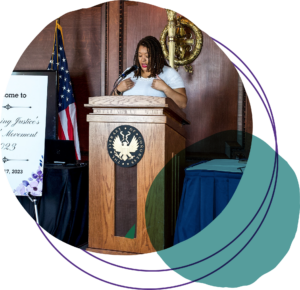The Challenge

Everyone should have the freedom and ability to make their own decisions about their bodyand future. In the U.S., the assault on rights and access to reproductive care, discrimination in maternal health care, and the criminalization of pregnant people causes deep harm to families and communities, especially those pushed to the margins who have long endured trauma, systemic racism, and reproductive oppression.
Our Approach
Irving Harris Foundation seeks a world where bodily autonomy is a respected human right and all people have the resources they need to birth their children with dignity and to raise them in safeand sustainable communities. The Reproductive Health & Justice (RHJ) program invests in the reproductive justice* movement, supporting efforts led by impacted communities to build grassroots power, dismantle barriers to respectful care, and advance gender, reproductive, and birth justice.